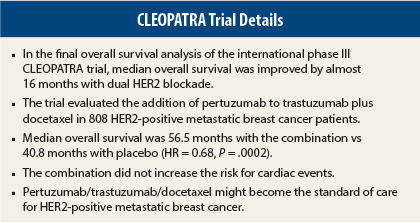In the final overall survival analysis of the phase III CLEOPATRA trial, HER2-positive metastatic breast cancer patients lived 15.7 months longer if they received pertuzumab (Perjeta) in addition to trastuzumab (Herceptin) and docetaxel, investigators reported at the European Society for Medical Oncology (ESMO) 2014 Congress in Madrid.1
“The 56.5 months of median overall survival is unprecedented in this indication and confirms the pertuzumab regimen as the first-line standard of care in HER2-positive metastatic disease,” said Sandra M. Swain, MD, FACP, Medical Director of the Washington Cancer Institute at MedStar Washington Hospital Center in Washington, DC, who reported the findings at a press briefing and at the ESMO Presidential Symposium.
“Many of us work our whole career to have this kind of data,” said Dr. Swain. “I’ve been doing this for about 30 years, and I have to say, this is very exciting for me and the patients I treat.”
Luca Gianni, MD, Head of the Department of Medical Oncology at the San Raffaele Scientific Institute in Milan, Italy, who formally discussed the study at the Presidential Symposium, shared Dr. Swain’s enthusiasm. “These are outstanding results,” he said. He added that the study has many strengths, and as for weaknesses, “Frankly, I couldn’t find any.”
“The combination of docetaxel/trastuzumab/pertuzumab is the new standard—not an option—for first-line treatment of HER2-positive metastatic breast cancer,” according to Dr. Gianni.
CLEOPATRA Details
The CLEOPATRA trial, which enrolled 808 patients from 204 centers in 25 countries, evaluated the benefit of dual HER2-blockade in metastatic breast cancer. Pertuzumab and trastuzumab bind to different sites on the HER2 receptor.
Patients were randomly assigned to trastuzumab and docetaxel plus either pertuzumab or placebo. They received pertuzumab at an 840-mg loading dose, then 420 mg intravenously or placebo every 3 weeks plus trastuzumab at an 8-mg/kg loading dose, then 6 mg/kg intravenously every 3 weeks and docetaxel at 75 mg/m2 intravenously every 3 weeks for at least six cycles (median of eight), with the anti-HER2 agents continued until disease progression.
A previous analysis performed in May 2012 showed that the addition of pertuzumab increased progression-free survival significantly, to 18.5 months, from 12.4 months with placebo. While a strong trend toward an overall survival benefit was observed, median overall survival had not been reached in the experimental arm.
The final survival analysis reported at ESMO, performed after 385 deaths and at a median follow-up of 50 months, showed median overall survival to be 56.5 months in the pertuzumab arm vs 40.8 months in the placebo arm (hazard ratio [HR] = 0.68, P = .0002).
Results Called ‘Phenomenal’
“I think these results are phenomenal,” remarked Dr. Swain, who is a Past President of ASCO. She noted that median survival with trastuzumab is already good, at nearly 41 months, but adding pertuzumab offers another 16 months of life to these patients. “I’ve never seen that in any other trial of metastatic breast cancer,” she said.
In the analysis, the previously demonstrated increase in progression-free survival was also sustained, which had formed the basis for the 2012 approval by the U.S. Food and Drug Administration of pertuzumab in combination with trastuzumab and docetaxel in this setting.
Median progression-free survival was 18.7 months vs 12.4 months—an increase of 6.3 months (HR = 0.68, P < .0001).
Dr. Swain commented at an ESMO press briefing that the similarity between the hazard ratios for progression-free and overall survival suggests that, at least for this placebo-controlled trial, “progression-free survival is a good surrogate for overall survival.”
No Increased Cardiac Concerns
Safety, including a lack of cardiac toxicity, was also confirmed in the updated analysis. “There were no new safety concerns or cumulative toxicity noted,” she indicated. “The majority of events occurred during the docetaxel portion of treatment. The safety data holds up at further follow-up.”
Grade ≥ 3 neutropenia occurred in 46.2% of the placebo arm and 49.0% of the experimental arm. Other grade ≥ 3 adverse events included leukopenia (14.9% vs 12.3%), febrile neutropenia (7.6% vs 13.7%), and diarrhea (5.1% vs 9.3%). Importantly, she said that symptomatic left-ventricular dysfunction as well as declines in left-ventricular ejection fraction were rare and were similar between the arms.
Symptomatic declines occurred in 1.8% of the placebo arm and 1.5% of the experimental arm, whereas left-ventricular ejection fraction declines to < 50% and by ≥ 10% from baseline were observed in 7.4% and 6.1%, respectively. One new symptomatic left-ventricular dysfunction event occurred in the pertuzumab group after 40 months, and resolved. Left-ventricular ejection fraction declines were reversed in 88% of patients.
“There was a concern that we would see more cardiac events with two monoclonal antibodies, but we actually saw less,” she reported.
Dual HER2 Blockade for All Patients
Dr. Swain maintained that, based on a consistent benefit across subgroups, virtually all women with HER2-positive metastatic breast cancer should be considered candidates for the pertuzumab/trastuzumab/docetaxel regimen at this point. Future studies are expected to confirm this, she indicated.
Co-investigator Javier Cortes, MD, of Vall D’Hebron Institute of Oncology in Barcelona, agreed. “I can see no reason to justify the use of trastuzumab without pertuzumab,” he said.
Dr. Gianni, in his discussion, emphasized that CLEOPATRA sets a new paradigm for the treatment of HER2-positive metastatic breast cancer “because of the almost 5 years of median overall survival and because patients gain a dramatic improvement of more than 1 year over the best possible treatment so far.”
The results are in line with the “dramatic improvement” also seen in NeoSphere, the trial he led in the neoadjuvant setting, where the triplet was associated with a 46% pathologic complete response rate. “That was with exactly the same treatment that is a winner in CLEOPATRA,” he noted.
“But no matter how big the success, ‘What comes next?’” he asked. “What can we do to improve the therapy of HER2-positive metastatic breast cancer beyond CLEOPATRA’s results?”
Since HER2-positive breast cancer is not a molecularly homogeneous disease, he suggested that improvements can be expected by addressing key features of this subtype linked to different sensitivities: hormone receptor status, PIK3CA status, and immune environment.
For hormone receptor–positive patients, whose outcome to this triplet is less robust than for hormone receptor–negative patients, he suggested testing pertuzumab/trastuzumab plus tamoxifen. For patients with PIK3CA-activating mutations, whose prognosis was worse than patients with wild-type disease in CLEOPATRA, the addition of a PIK3CA inhibitor, or the use of ado-trastuzumab emtansine (Kadcyla, formerly known as T-DM1), might be beneficial. Future research may also show that the use of the new immunomodulating agents could be of value in addressing resistance to this combination.
Meanwhile, he said, clinicians have a new treatment paradigm to apply to their patients. “CLEOPATRA is an unquestionable therapeutic success,” he stated, “with unquestionable clinical implications.” ■
Disclosure: Drs Gianni and Cortes reported no potential conflicts of interest. Dr. Swain has received research funding (via her institution) from Genentech/Roche, is a steering committee member (uncompensated) of Genentech/Roche, received travel expenses from Genentech/Roche, and honorarium from Roche.
Reference
1. Swain S, Kim S, Cortes J, et al: Final overall survival analysis from the CLEOPATRA study of first-line pertuzumab, trastuzumab, and docetaxel in patients with HER2-positive metastatic breast cancer. ESMO 2014 Congress. Abstract 3500. Presented September 28, 2014.





